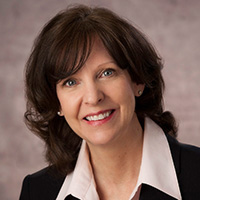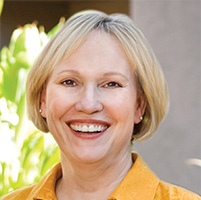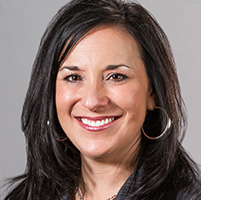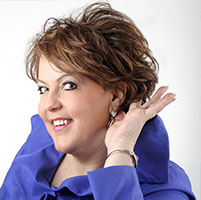15 minutes
Some obstacles aspiring female leaders face may be self-imposed.
Before women can shatter the glass ceiling, they may need to take a sledgehammer to walls of their own making.
In a recent Harvard Business Review article, Herminia Ibarra, Robin Ely and Deborah Kolb write that “the fragile process of coming to see oneself, and to be seen by others, as a leader … involves a fundamental identity shift” for many women. That shift can be derailed by self-imposed barriers as well as external biases. Too often, in response to external biases, women create such barriers for themselves as unrealistic expectations and impossible standards for achievement. Several credit union leaders offer suggestions on surmounting both types of obstacles to leadership.
Avoid False Choices
As president/CEO of $1.3 billion Solarity Credit Union, Yakima, Wash., Mina Worthington meets with all new employees of the organization and invites them to ask questions. Looking at the family photos displayed in Worthington’s office, many female employees simply ask, “How do you manage?”
“Women still feel that there’s a choice that has to be made: ‘I can either choose family or work myself to death for a career,’” Worthington says. “Male counterparts have never told me that they have to choose between career and family, but for many women, taking on a leadership role implies more hours, stress and too much work responsibility.”

|
Worries about time management seem to be primarily a female preoccupation, suggests Debora S. Almirall, president/CEO of $100 million Minnesota Power Employees Credit Union, Duluth, Minn.
“I don’t see men as concerned with this issue. Women need to know that they don’t have to do everything, and it’s not going to be perfect,” Almirall says. “You don’t have to go to every event, be the head of the PTA for your kids, work a ton of hours and volunteer all of your weekends to be effective. Just choose a couple of things at a time, give them your attention, and over time it adds up. I have personally had success with boards that meet over the lunch hour. I can give up my lunch time and not impact my family.”
Lead the Way
Worthington’s views on having to choose between work and family have evolved from a dominant focus on her career to a realization that she has time in her life for both.
“I don’t have to work 70 hours a week. I leave at 5 and go home and fix dinner. I take the kids to baseball practice and go to all their games,” she adds. “The pace here at Solarity is super-fast, but women do take full maternity leave and make time to pursue their personal passions. One woman takes a month off every year to travel the world. We plan for that. We take it out in the open: ‘Here’s how it will happen, how we’ll cover and support one another.’”
Deedee Myers, Ph.D., CEO of DDJ Myers Ltd., Phoenix, suggests that women make a “declaration” about their work and life choices, to be supported by effective practices and feedback loops. “I’m in a declaration to be an awesome single mom for my children and a masterful partner for my clients,” she says. “My practices include self-care, quality time with my children with limitless interest and love for who they are, and, lastly, picking clients with whom I enjoy sharing my gifts.”

“Developing a leadership presence that is externally and internally aligned is a powerful journey, not an overnight phenomenon.”
Deedee Myers, Ph.D.
The deliberate act of making a declaration underscores the accompanying choices, from selecting simple, time-saving dinner options to making more impactful career choices, she adds.
Aim for Excellence, Not Perfection
Doubts about one’s professional accomplishments and fears of being exposed as a fraud are common enough that they have a name: “imposter syndrome.” These feelings may manifest in the need to try to achieve superhuman status and “the desire to do all things well”—from business projects to the best-ever children’s birthday party—says Susan Mitchell, CEO of Mitchell, Stankovic and Associates, Boulder City, Nev.
Imposter syndrome may make women feel they’re not good enough to move up the leadership ladder because they haven’t attained perfection. It may drive them to prize the appearance of invulnerability and independence over the willingness to delegate, collaborate and ask questions. In addition, especially for women who tend to take everything on themselves, it can be hard to compartmentalize the role of primary caregiver at home and increasing responsibilities at work.
Denise Gabel has another term for feeling overwhelmed and plagued by self-doubt when taking on new challenges: “Freak Week” is the shorthand coined by her husband some years back in response to Gabel’s panic about going back to school while working full time.
“I was doing something big, something foreign, something unknown. I came home and it was just like ‘I don’t know if I can do this,’” says Gabel, COO of the Northwest Credit Union Association. “My husband said calmly, ‘Oh, you’re in Freak Week.’ Excuse me? And he said, ‘This will pass in a week, when you settle in and realize you’ve got this.’”
Now, when Gabel starts to feel overwhelmed, she acknowledges that she’s been there before—and she can manage it. “I’m in Freak Week. It’s happening, and it’s probably going to happen again, but I’m fine,” she says. “I think it’s pretty common that people who are taking on new challenges and risks are going in and out of this imposter syndrome.”
Take Chances
The specter of being overwhelmed is akin to another barrier for some women, Worthington suggests, a self-perception that they’re not qualified for leadership roles. Both of those fears “create false thoughts that can become real if we believe them,” she cautions.

|
“Who is ever 100 percent qualified for a position?” she adds. “You put your resume next to a list of job qualifications, and sometimes there’s only a 20 percent match. Many men wouldn’t see that as a barrier to entry. What is it that makes women feel that way?”
The answer may be rooted in deep-seated cultural norms that can only be overcome by recognizing and consciously breaking down these beliefs. Of the four females and two men on Solarity CU’s executive team, the women consistently rate themselves lower than their male counterparts in self-evaluations, Worthington notes.
“We’ve had open conversations about getting past perceptions as to how their skills align,” she says. “We talk about assertive leadership and learning to step up and argue for our point of view when necessary—about the power of tenacity, positivity, the will to win, and the confidence that if we keep working at it, the net result is that we will move this organization forward.”
Women may be held back in their pursuit of leadership roles by “thinking that people will notice their accomplishments and recognize them with new career opportunities. That doesn’t happen often,” Mitchell notes. “You have to go all-in, be vulnerable and experience rejection. Apply for the position. Become a volunteer. Each time you seek, you will learn more and sharpen the saw. Keep standing up.”
Get Out of Your Own Way
“Early in my career I had a boss suggest I was standing in my own way,” Gabel recalls. That observation came with no further explanation or recommendations, so she decided to monitor her actions and behaviors to make her own determination. After all, she concluded, “if I am standing in my own way, I’m the only one who can get out of my way.”
Not long after that conversation, Gabel was in a meeting of about 18 people. She remembers the setting vividly, a U-shaped table with the conversation moving from person to person. As her turn to speak approached, two voices were debating in her head: “Yes, I should state my opinion.” “No, what if my opinion is way off?” Gabel picked a side, formulated her thoughts—which happened to be an opposing view to the main presenter’s perspective—and reached down to grab her chair, as if to ground herself as she shared her contribution. There was no immediate reaction as the facilitator moved on to the next person. But after the meeting, three people came up to thank Gabel for sharing her views.
“I think, first, they appreciated my opinion. And second, I actually had people say—and these were people who had a superior position—that they’d just seen a different side of me,” she says. “And I thought, ‘That is a strong YES.’ I really had been standing in my own way, but I didn’t see it until I tried it on.”

“I don’t know that we always listen when people say things like, ‘You’re smart.’ ‘You’re funny.’ ‘You’re a good problem-solver.’ ‘You’re a leader,’ when at the same time we have voices inside our heads saying, ‘You talk too much. You’re a Debbie Downer.’ We can choose who we listen to.”
Denise Gabel
One of Gabel’s lessons learned from that experience is to listen to what others are saying even while critically assessing her own internal dialogue. “I don’t know that we always listen when people say things like, ‘You’re smart.’ ‘You’re funny.’ ‘You’re a good problem-solver.’ ‘You’re a leader,’” when at the same time we have voices inside our heads saying, ‘You talk too much. You’re a Debbie Downer,’” she suggests. “We can choose who we listen to.”
Develop a Leadership Presence
Of course, not all barriers are self-imposed. Both subtle and more overt forms of gender bias persist in some workplaces. Myers was paid $10,000 less annually than her male counterparts in her first job out of college—even though she had more education. “Three months later, I was told no matter how hard I worked, I would not be promoted because men are promoted first,” she recalls.
Her response was swift and deliberate: “I organized to learn as much as possible about all aspects of the business and then took that knowledge to another company where I would be more appreciated.”
To this day, Myers suggests, many women are not asking for what they need to step into their potential—to receive fair compensation, to be considered for promotion, to be developed as leaders.
“Language, declarations, choices, and action and feedback loops are required ingredients to remove barriers that hold us back from our potential,” she says. “Language is the technology of humans. When we use language that is powerful and forward-moving, we create a momentum that is inspiring to ourselves and others. Being wishy-washy in language and tonality of voice and body creates the assessment that we are unclear and not confident.”
Women may need to train or retrain their voices and bodies to convey a leadership presence that supports their professional development, Myers says. “I say ‘retrain’ because many of us came into the world with more determination and intention in our bodies, and over the years those traits started to peel away.”
Practice in the elements of a leadership presence—adopting more powerful ways of standing, speaking, and making requests and offers, for example—is more effective with colleagues of both genders, she adds. And it is a long-term commitment: “Developing a leadership presence that is externally and internally aligned is a powerful journey, not an overnight phenomenon.”
Build Your Support Network
Stephanie Sherrodd, CCE, president/CEO of $3.2 billion TDECU, Lake Jackson, Texas, and immediate past chair/director on the CUES board, had the fortune to work for two role models—female CEOs of credit unions—early in her career and to have the support of friends, family and mentors who supported her in her career goals and offered useful feedback.
“It really is a matter of believing in yourself that you can get to the career you want—and to be able to surround yourself with people who also believe in your dreams,” Sherrodd says. “Committing to a relentless pursuit is important—that you have that belief in what you want to accomplish. I had many opportunities to see that I could be a CEO one day, and there was a path for me to get there in some manner.”
Another way to get support is by joining an active group of professionals—for women or men—who support each other. Mitchell is the founding chair of the World Council of Credit Unions’ Global Women’s Leadership Network, which now includes more than 2,000 members from 78 countries with 62 local Sister Societies in 16 countries. At one recent Sister Society meeting, a participant told Mitchell that after her promotion, she received congratulations and best wishes from many male colleagues, but no women.
“I think we communicate with each other, but we don’t naturally look to promote each other and recognize our successes,” she says. “I always ask women to name their top five mentors and then note how many are women.”
Mitchell’s advice is to “network with your peers, both male and female. Build confidence in the things you do well by examining your success and opportunities for development. Seek to find an advocate or champion who gives you authentic feedback and a little ‘kick in the behind’ to ensure you’re going for the next thing in life.”
Networking through groups like the GWLN Sister Societies can offer valuable support and opportunities to develop leadership skills, Almirall notes. The Sister Society in Minnesota relies on a group of ambassadors to help plan its networking events. Originally, a lot of those planners were CEOs, “but now we have turned it over to emerging leaders to run our network.”
Be Your Own Best Coach
As important as support and mentoring can be, women also benefit from self-coaching. Mitchell takes a concrete approach to being her own coach by setting goals for personal, professional and self-development, working toward them and regularly taking stock of her progress. “I check the boxes, pat myself on the back, celebrate the moment, and then, I set new goals for the future,” she says. “These goals must be life goals, well-rounded to ensure I am building a foundation for the next level.”
People can look to others for mentoring and support, but striving for personal and professional development “starts with an internal analysis of where you are currently, based on your ambitions, your drive, your enlightenment and your willingness to learn,” Mitchell says.
That final attribute is especially crucial in making the most of professional development opportunities at work. There can be a disconnect between executives recognizing potential in their team members and candidates who agree to coaching and professional development because their boss recommends it, not because they expect to learn, Mitchell contends.
“It’s tough sometimes to sit down with someone and say, ‘You’re doing a great job, but let’s talk about these areas,’” she notes. “People can hear that, accept it and apply it, or they can say, ‘Well, that’s not right.’ I don’t think there is anything more frustrating to senior executives to see someone who has talent and is given opportunities and doesn’t take advantage of them. Not only is it a missed opportunity, but it’s also an expense and a time commitment.
“People will say of an executive, ‘She works with her favorites,’” Mitchell adds. “But quite often, those ‘favorites’ are the people who are doing their jobs, the people who are making things happen. So get in there and be a favorite. Choose to be that person.”
Give Yourself Credit Where Credit Is Due
Men seem to have an easier time than women, generally speaking, when it comes to seeking promotions and touting their accomplishments, observes CUES member Jennifer Lee, but it is down to women to correct that disparity.
“We don’t give ourselves enough credit. We don’t look in the mirror and say, ‘You can do this better than anyone else,’” says Lee, VP/finance with $2.4 billion, Provident Credit Union, Redwood City, Calif. “And I don’t think we’re good at asking for what we deserve, either.”
Over her career, Lee says she has worked to develop her abilities to ask for and make a case for the promotions and salary hikes she has earned. In her efforts to become her own advocate, Lee says it has been helpful to be able to call on trusted friends and colleagues for their frank perspectives on where she can make improvements and where she might be selling herself short.
“It helps to have a support group around you, people who know what you’re worth and folks you can have an honest conversation with,” she says. “These are people who are willing to say, ‘These are your great attributes, and here are areas you might want to work on.’”
Working in “the high-tech land of Google and Apple,” Lee has seen women make strides in corporate leadership, and she says the credit union industry stands out in terms of opportunities for female managers and executives. For example, of the four assistant vice presidents who report to her at Provident CU, three are women.

“We need to remind ourselves and each other that we deserve more, not just in pay and title, but in recognition for how good we are and for the differences we’re making in the community.”
Jennifer Lee
Still, she suggests, “we have a long way to go” to achieve parity. At a recent event with 60 credit union executives, only a third of participants were women, she observes, and she was one of only a few minorities in the group. At the same time, Lee adds, efforts toward continued progress may need to come from women themselves.
“I have girlfriends who are controllers and CFOs, and I can see them grinding, not able to recognize their own worth to their organizations,” she says. “We need to remind ourselves and each other that we deserve more, not just in pay and title, but in recognition for how good we are and for the differences we’re making in the community.”
Think Big
“There are times when people don’t think about their ultimate career move maybe as big as they could and should,” Sherrodd says. “It’s OK to say, ‘I’d like to be a CEO someday. What do I need to do to get there?’ Ultimately, your path might not take you there, but having big aspirations is a great way to set out on your career path and give you the most options.”
At the same time, “worry about the job you have more than you worry about the job that you want to have,” she adds. “Attaining a high competency level and doing the job that you have now really, really well is the path to the next job.”
Karen Bankston is a freelance writer based in Oregon.





